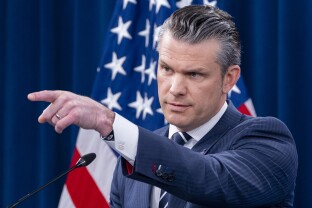The Pentagon removed key protections for civilian defense workers and directed that managers move with “speed and conviction” to fire employees with “unacceptable” performance reviews.
The directive came as part of a previously unreported memo distributed in September, just a day before the government shut down. Defense Secretary Pete Hegseth appeared to preview the policy change during a speech to hundreds of the military’s top leaders last month.
“The sooner we have the right people, the sooner we can advance the right policies. Personnel is policy,” Hegseth said.
The memo, sent on Sept. 30 and signed by Undersecretary of Defense Anthony Tata, makes it easier for managers to fire government civilian employees. It also warns that managers will be held accountable if they do not address “poor employee performance.”
Sign Up for NOTUS’ Free Daily Newsletter
“Supervisors and human resources (HR) professionals are directed to act with speed and conviction to facilitate the separation from Federal service of employees performing unsuccessfully,” the memo said.
The memo is the most recent part of Hegseth’s massive reorganizing of the Defense Department. Hegseth set a goal to shrink DODs workforce by 5% to 7% in March and has since worked to fire probationary employees, freeze hiring, offer buyouts, reopen early retirement and order department organizations to submit ideas for eliminating “redundant or non-essential functions.”
The new rules in Tata’s memo introduce additional subjectivity into job performance evaluation by altering the Defense Department’s “Douglas Factors,” which are criteria used for federal job performance evaluations, one defense civilian explained to The Washington Post.
Defense One reported that since the start of Hegseth’s tenure, more than 60,000 employees have left the Defense Department, about 7.6% of its workforce, according to numbers the agency provided.
The Pentagon did not respond to NOTUS’ request for comment but acknowledged the memo in a statement to the Post.
“The Department is in the process of adapting to the new guidance outlined in Under Secretary of War Tata’s memo from September 30th and we have nothing specific to share at this time,” according to the statement.
Hegseth called senior military leaders from across the world to Virginia on Sept. 30 to hear his new expectations for the U.S. military, including more stringent fitness requirements and a ban on facial hair.
Reuters reported Tuesday that the Pentagon moved to require military officials involved in its ongoing operations against alleged drug smugglers in the Caribbean and Pacific to sign nondisclosure agreements. The strikes, which started in early September, have since killed almost 50 people in nearly a dozen attacks.
Earlier this month, the Navy’s top admiral responsible for overseeing military efforts in the Caribbean Sea resigned after speaking out against the strikes, just one year into his three-year term.
Speaking in Virginia, Hegseth said he was “liberating” military leadership.
“If the words I’m speaking today are making your heart sink, then you should do the honorable thing and resign,” he said.
Sign in
Log into your free account with your email. Don’t have one?
Check your email for a one-time code.
We sent a 4-digit code to . Enter the pin to confirm your account.
New code will be available in 1:00
Let’s try this again.
We encountered an error with the passcode sent to . Please reenter your email.


